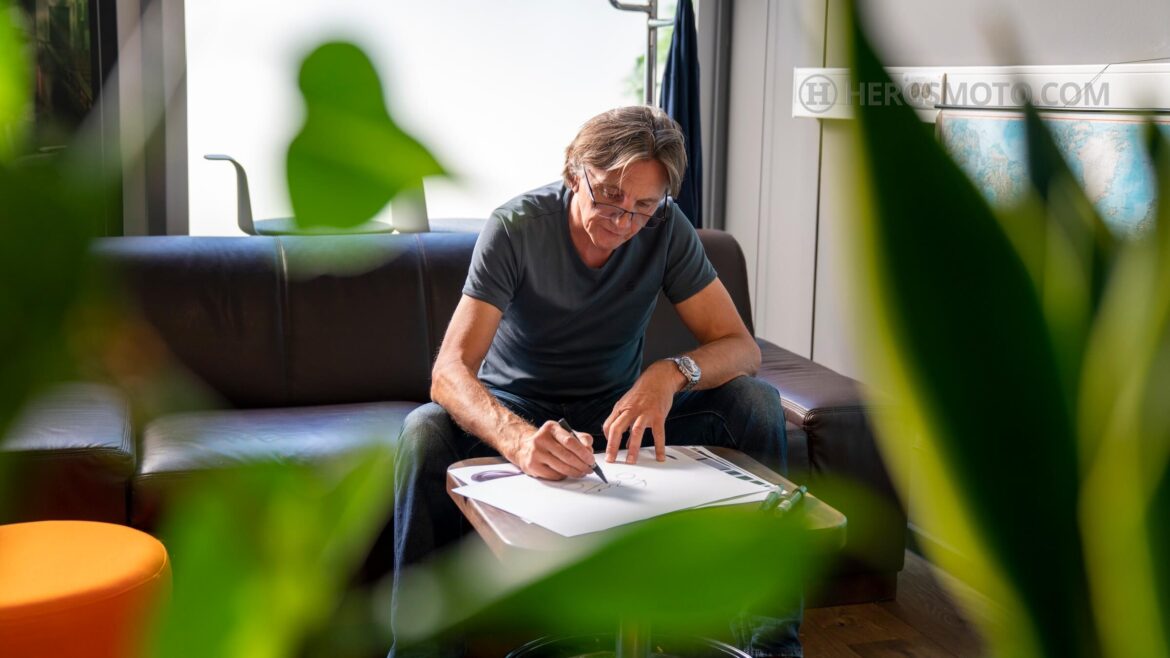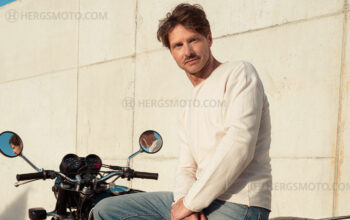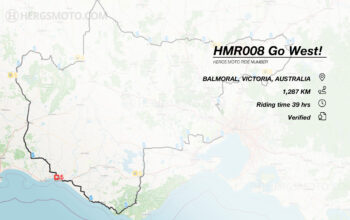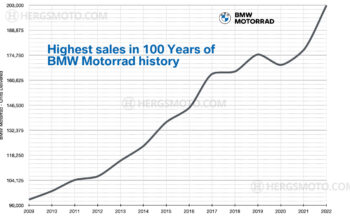Original Hergs Moto story published Nov. 22, 2020 Contemplation of a future fast approaching.
With the world premiere of the BMW Motorrad Definition CE 04 with its innovative architecture and trailblazing design, we’re really seeing a glimpse into a future fast approaching.
“Electric mobility is a central drive system for the BMW Group and we are consistently relying on this technology in our sustainability strategy. Electric drives are also a current topic for BMW Motorrad, especially for the urban environment. Since 2013, we have been a pioneer in this area with the BMW C evolution scooter. The BMW Motorrad Definition CE 04 is the logical continuation of the electromobility strategy for urban conurbations and provides a concrete preview of what a contemporary production vehicle could look like, with which we will take two-wheel electric mobility in metropolitan areas to a new level, both technically and visually,”
…explains Edgar Heinrich, Head of Design at BMW Motorrad.
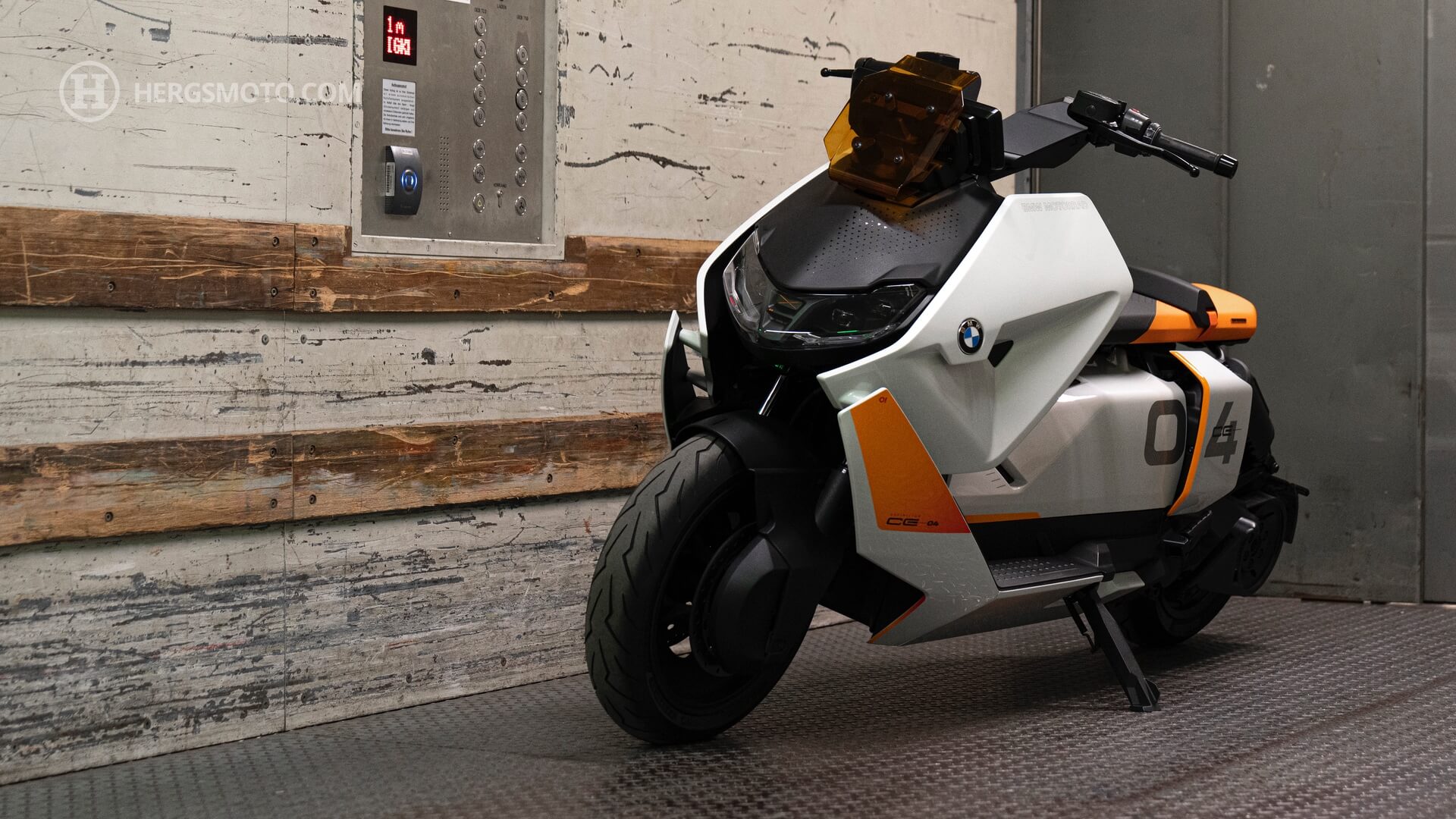
BMW Group describe the BMW Motorrad Definition CE 04 as “Plugged to Life” and a new form of urban two-wheel mobility. This statement sparks several topics worth exploring in relation to what is happening as we’re currently living in a time of accelerating change.
Called “Definition” CE 04 because it is more than a concept.
With its electric drive system, trailblazing design and innovative connectivity solutions, BMW Motorrad say the Definition CE 04 is setting out to change the face of the scooter segment as we know it.
Being purpose built, it has allowed a freedom of design to create future mobility that is part of a solution.
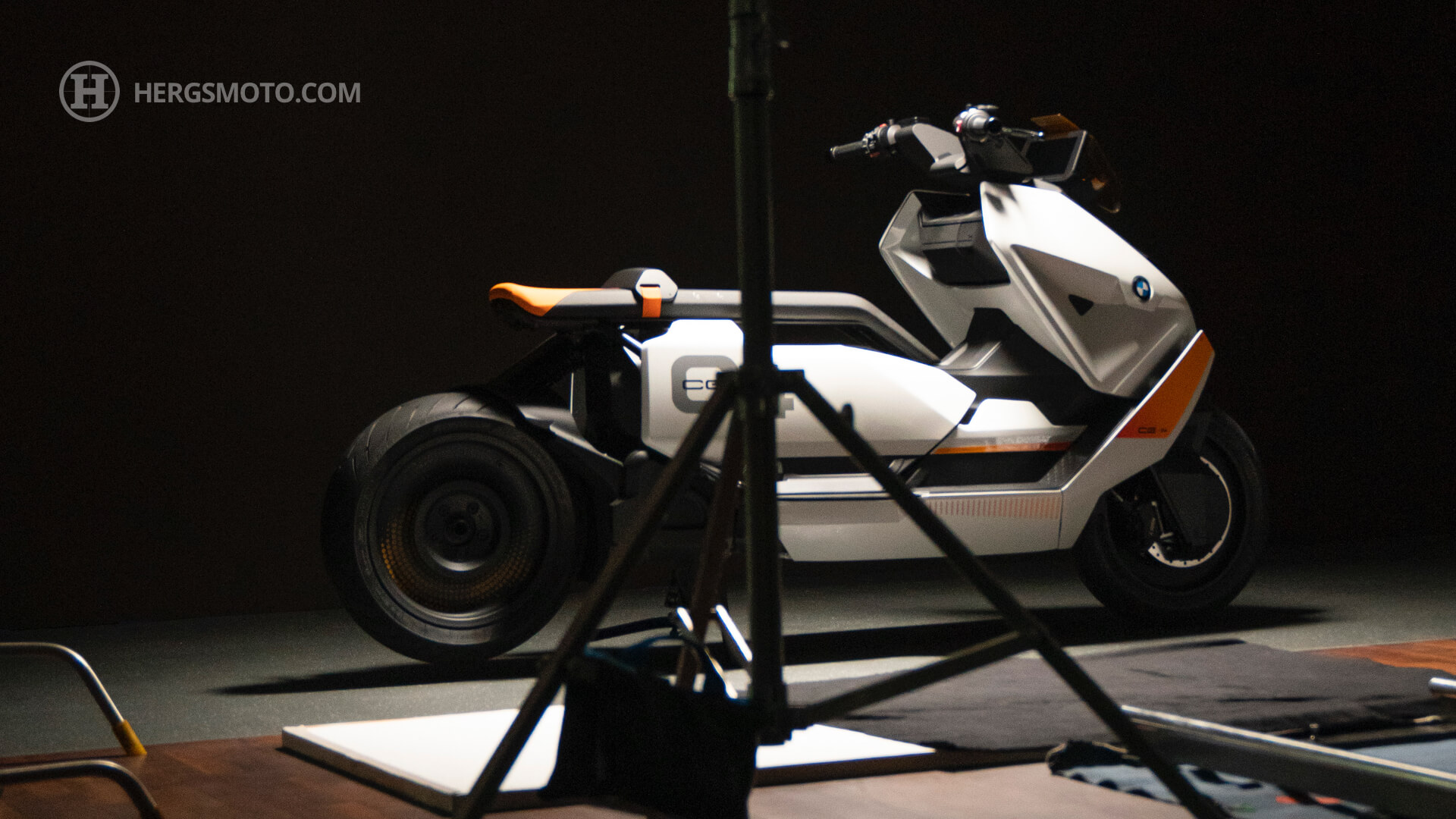
Urban transport as a device.
A large connected lifestyle device much as we now see our phones and other devices in our homes that keep us linked to a digital life. A digital life that is only set to gain deeper integration.
So we hear the words connected & integrated… but what does that really mean?
It means simply an evolution of a continuously connected life.
Where a short trip means you are able to remain talking to your friends, know where you’re going and how long it will take. To know what’s around you and be safer all the while you go about your life. All in a more seamless, cohesive environment. Hence the transition from simply a convenient vehicle getting us from A to B as we know, but to another device that enables a continuity of our digital lives.
In 2016 BMW Group made a clear statement regarding integrated connectivity and emission-free energy amongst other things, saying specifically:
Connectivity is becoming second nature. In the future, everything will be connected. The BMW Group firmly believes that digitalisation and digital intelligence are meant to serve people. That is the only way they will permanently enhance our quality of life.
Energy is becoming emission-free. In the future, energy will increasingly come from renewable sources. The BMW Group has a clear vision of environmentally-compatible vehicles built using renewable energies and recycled without generating emissions. It is working towards becoming a wholly sustainable company.
2016 BMW Group THE NEXT 100 YEARS
4 years on from that statement and the CE 04 is a continuation of a carefully planned e-journey.
“The BMW Motorrad VISION NEXT 100 embodies the BMW Group’s vision of biking in a connected world – an analogue experience in a digital age. Motorcycling is about escaping from the everyday: the moment you straddle your bike, you are absolutely free. Your bike is The Great Escape”
said Edgar Heinrich, Head of Design at BMW Motorrad, outlining the core principles underlying BMW Motorrad’s Vision Vehicle.
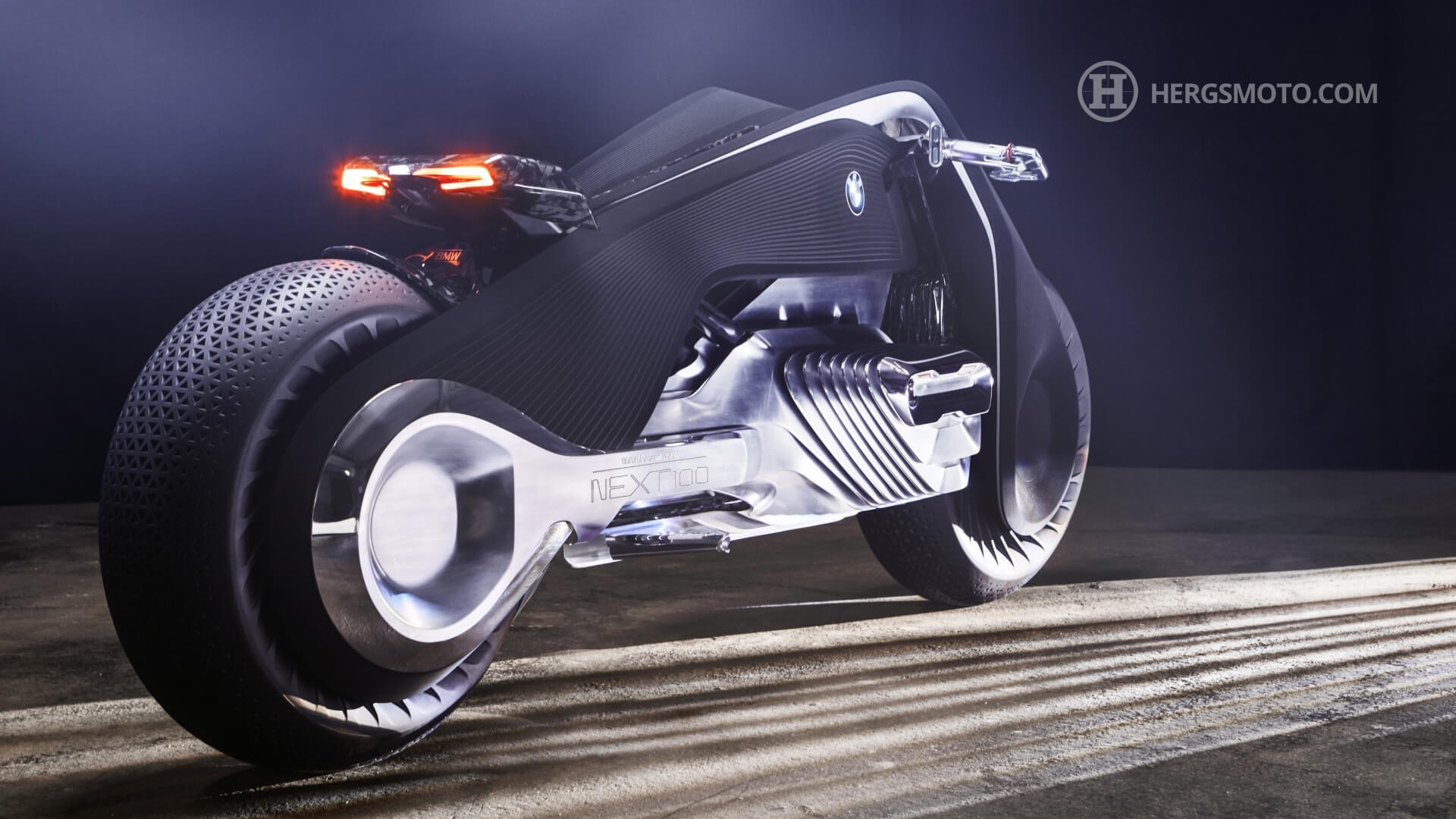
Which leads to the core of the story, BMW Motorrad’s journey of electrification.
Long product development cycles.
Evident in many industries and more so with the key players such as Apple and BMW to name but just two. They intentionally take their time to not just bring products to market, but to define the segments that they enter.
In some cases, from an idea through to a fully fledged product can take up to 10 years. Not always the case but in BMW Motorrad’s historical product development there are some clear examples of long development cycles.
Let’s for a moment look at the e-product trajectory to date, in order to contemplate where it might be heading in our very near future.
Lets begin more than 10 years ago with the 2009 BMW C1-e.
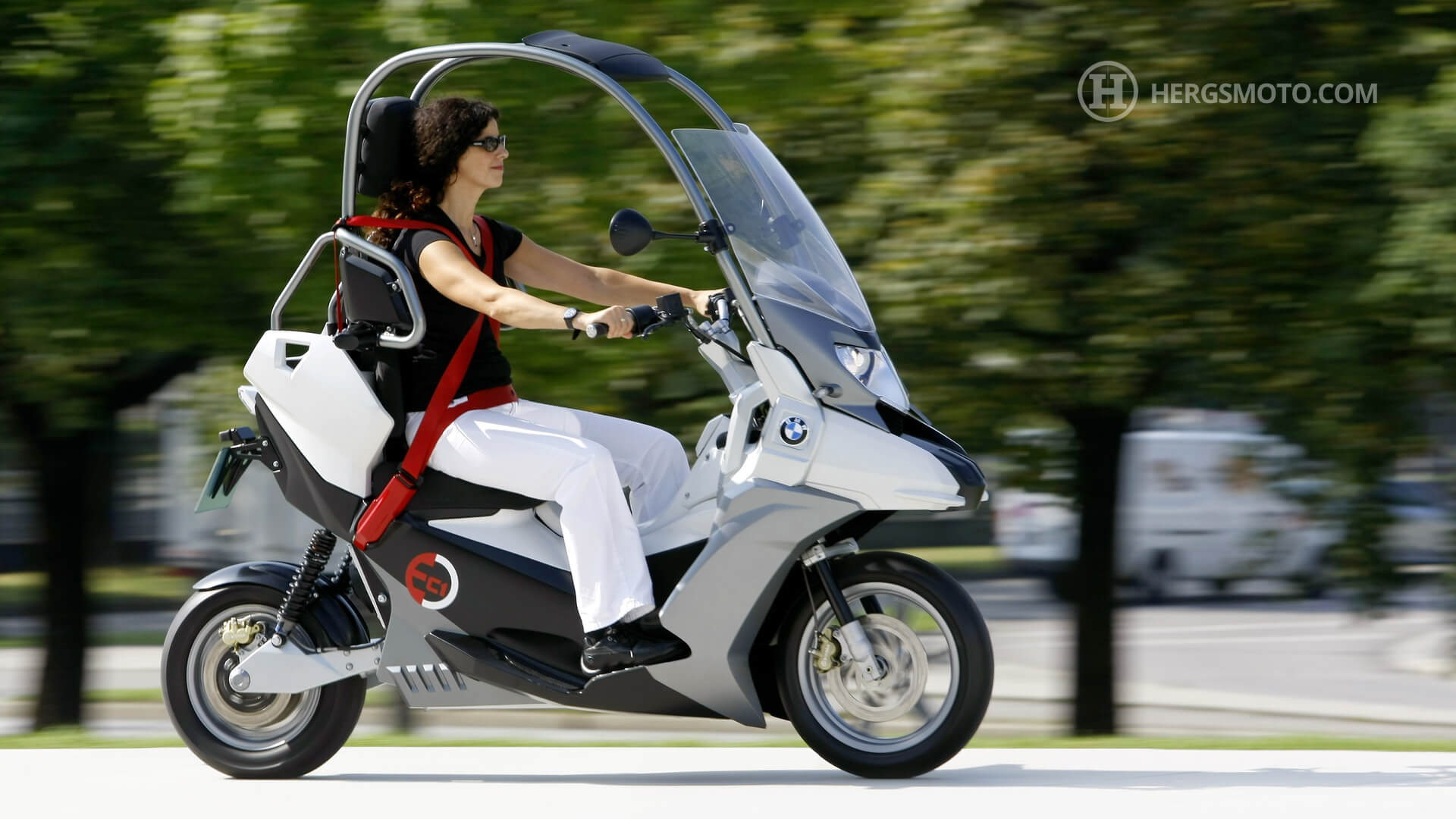
While developed over some time prior, in October 2009 it was described as what a safe, environmently friendly and highly practical single track vehicle for city traffic could look like in the future. BMW Motorrad developed the C1-e study as a contribution to the European safety project eSUM. Characterized by a very high level of active and passive safety and driven by… an electric motor.
Two years later, November 2010 we get the “The scooter of the future made by BMW Motorrad”. Which, while a conventional scooter and the start of the C-series as we know it today, it was clearly always inclusive of an e-option in the design and development.
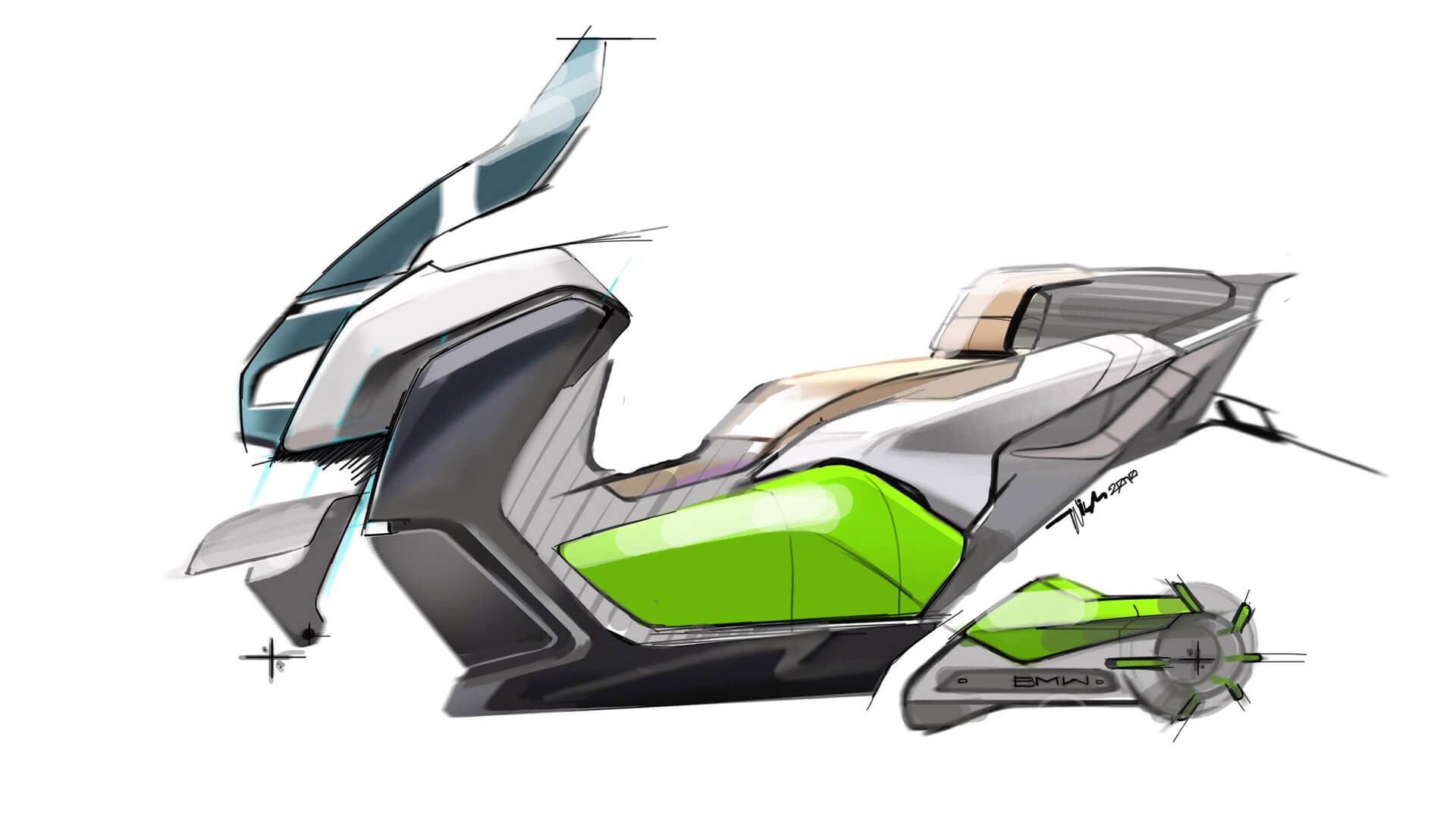
Again, evident in the fact that only a little over 6 months later in July 2011 BMW Motorrad publicly debut a Concept Vehicle BMW E-Scooter. They called it an innovative development study with electric drive.
“The Concept e”.
Then a vision: BMW Motorrad designers have developed the style and shaping of the e-scooter of the future – electric, digital, dynamic.

The presentation of the BMW C-Evolution and trials happened a year after that reveal and statement, in July 2012 and at the time, BMW said:
There have been drastic changes in the requirements for individual mobility concepts, in particular for conurbations. More than ever before, individual mobility is defined today in terms of sustainability. Growing traffic volume, rising energy costs and constantly increasingly stringent CO2 restrictions on vehicles in inner cities – these are the challenges of the future.
Following the BMW Group’s sustainability strategy, BMW Motorrad aspires to consistently pursue electromobility at this early stage, especially in the urban environment. In a similar way to BMW i in the automotive division of the BMW Group, BMW Motorrad’s accelerated development of single-track mobility likewise stands for visionary vehicle concepts and mobility services…
In April 2014, not quite 2 years later, the launch of the production version of the C-evolution marked the start of a new chapter in the urban mobility segment for BMW Motorrad.
The press release at the time stated that the new C-evolution was in keeping with the BMW Group’s sustainability strategy with BMW Motorrad taking a fully committed approach to electric mobility. Development of the C-evolution revolved around creating a visionary vehicle concept offering maximum everyday practicality and an inspirational design. One year later we started to see the evidence of a much wider plan taking shape.
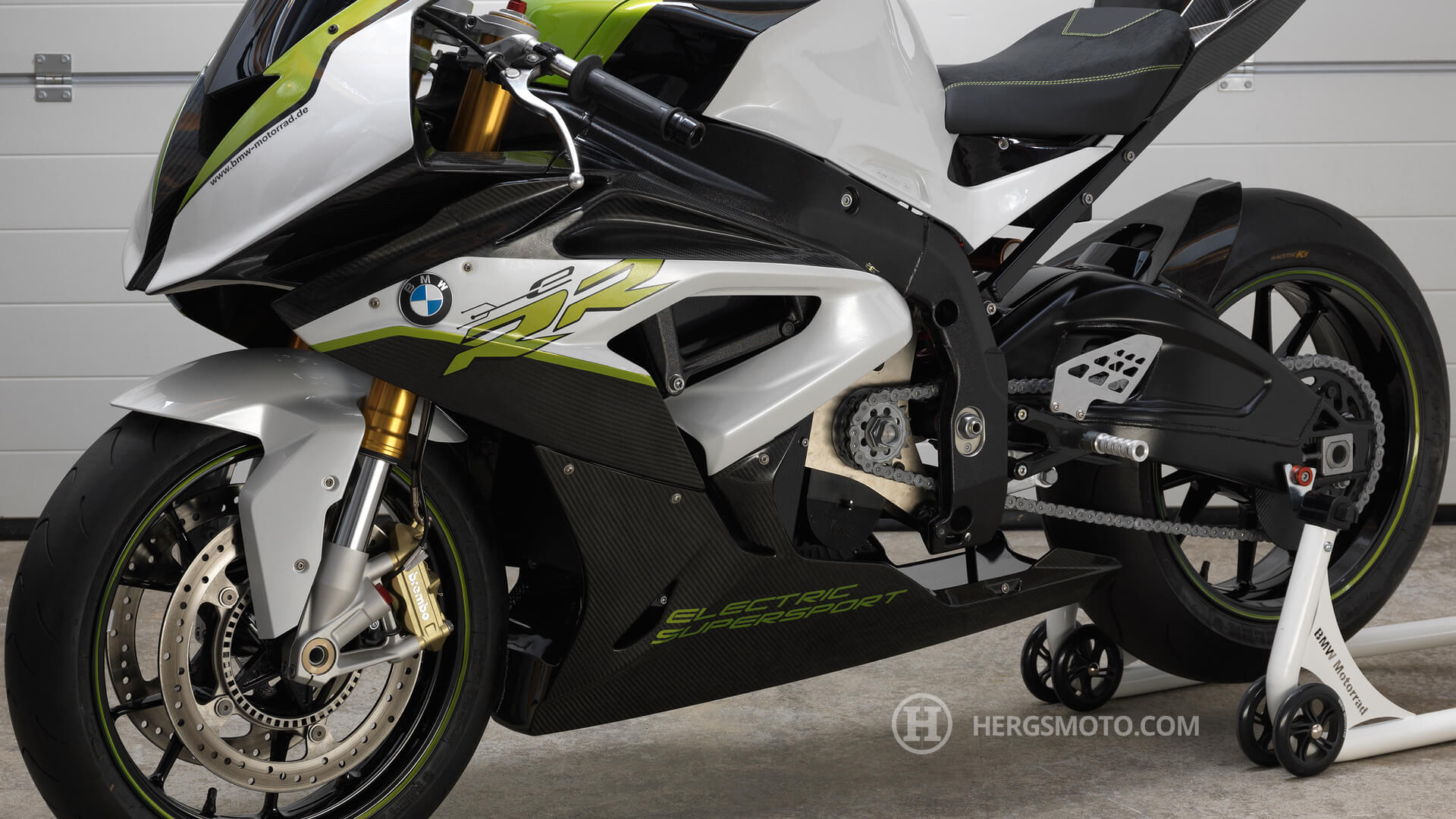
November 2015 BMW Motorrad presented an “experimental vehicle”, the Supersport eRR.
BMW Motorrad going one step forward showing more of the possibilities of an all-electric drive in a supersport motorcycle. Regarding design and chassis technology the eRR leans on the supersport motorcycle S 1000 RR, however using an all-electric drive.
This illustrated an advanced level of both thinking and engineering when you look at just how “finished” that experiment was when it could have been a more rudimentary mule for the purposes of experimentation.
This was followed by a superbly imaginative and brilliantly executed look into the future.
The Vision Next 100, October 2016
The black frame triangle of the beautifully crafted BMW Motorrad VISION NEXT 100 was a deliberate reference to the very first BMW motorcycle, the R32 made in 1923.
A reference to keep in mind as we explore the timeline and development cycles further.
“The BMW Motorrad VISION NEXT 100 embodies the BMW Group’s vision of biking in a connected world – an analogue experience in a digital age. Motorcycling is about escaping from the everyday: the moment you straddle your bike, you are absolutely free. Your bike is The Great Escape,”
…said Edgar Heinrich, Head of Design at BMW Motorrad, outlining the core principles underlying his brand’s Vision Vehicle.
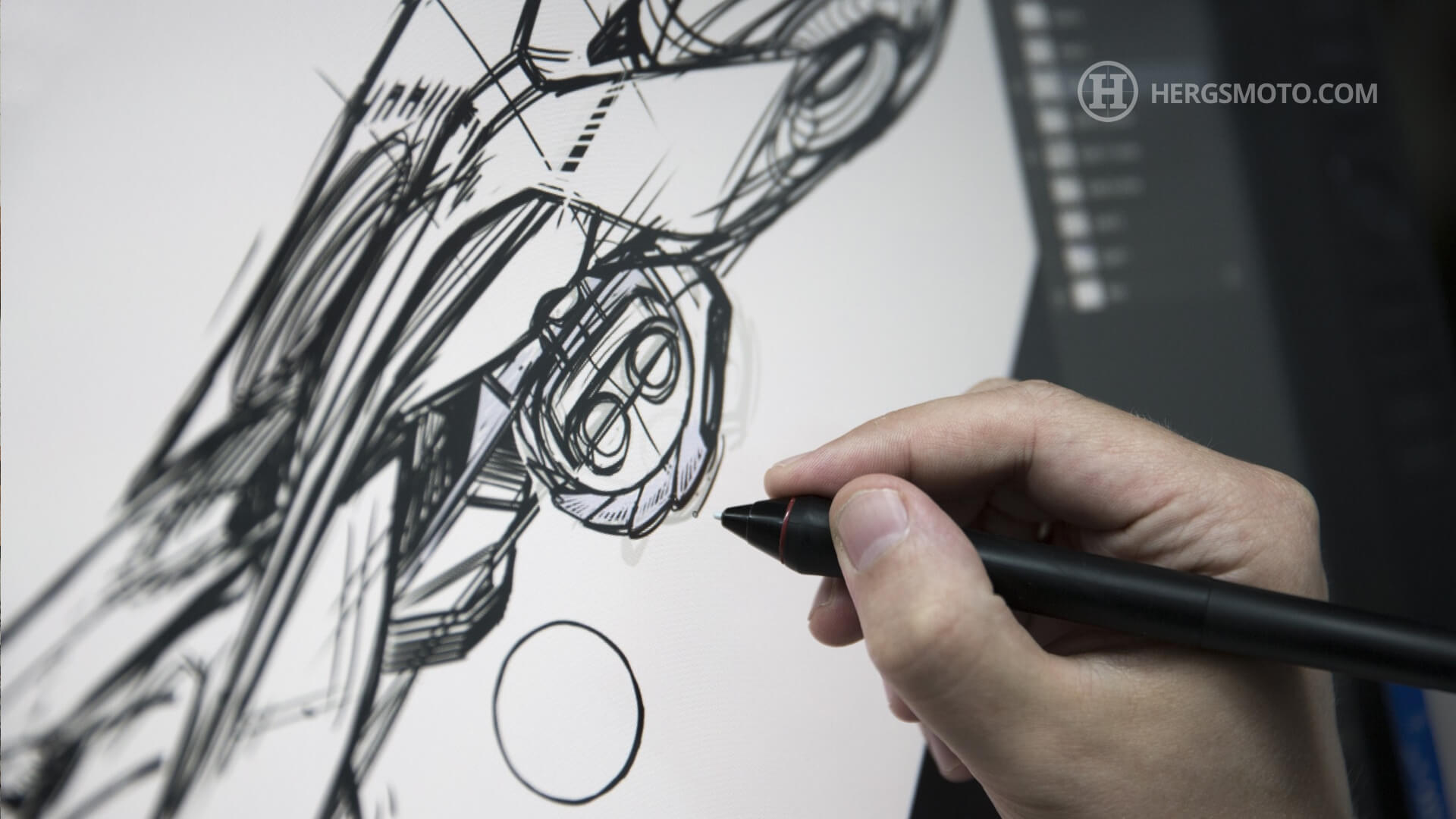
May 2017 Link concept
Conceived, designed and built before; At the Concorso d’Eleganza Villa d’Este in 2017, the BMW Group presented its vision of zero-emission urban mobility on two wheels: the BMW Motorrad Concept Link.
At the time the BMW press release read that it was…
“Inspired by the BMW Motorrad Vision Next 100, the design study unites digital connectivity with the demands of urban mobility on two wheels. It treads new paths and moves beyond established conventions both with regard to design and technology.”
From pre-concept to pre-production, it’s almost the same bike as you see in the Definition CE-04. In August 2021 it will be on par for a 5 year incubation if we see a commercial release in 2021.
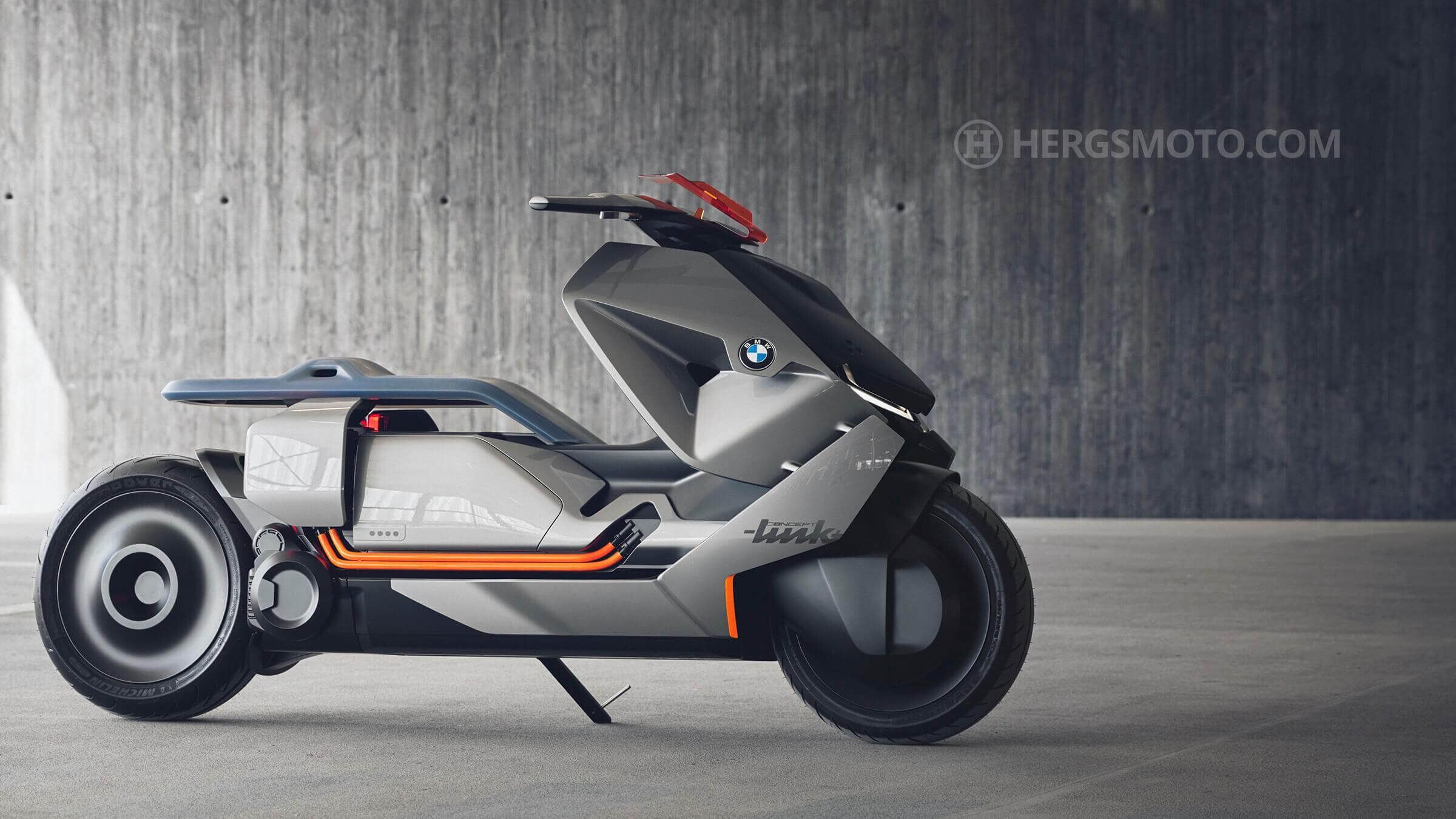
Continuing on and as the BMW Group consistently pursues electrification, they question what a BMW motorcycle might look like that is electrically powered. And how would it reveal itself at first sight to be a BMW.
One possible answer to these questions was provided by the BMW Motorrad Vision DC Roadster design concept. A highly emotional naked bike with an electric drive.
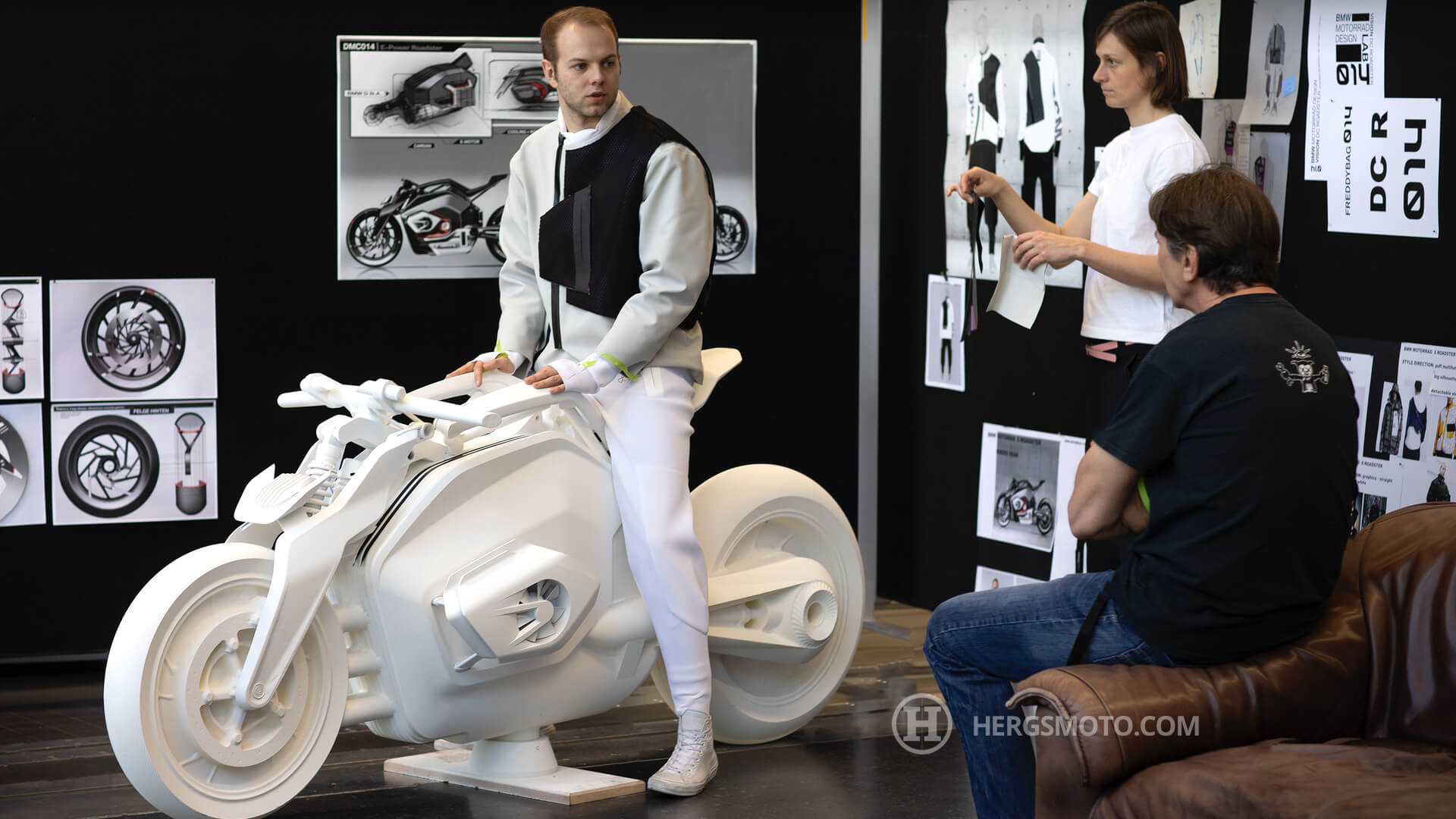
June 2019 the BMW Motorrad Vision DC Roadster was presented to the world.
BMW revealed the concept saying…
“The BMW Motorrad Vision DC Roadster is a visionary symbol of the future of BMW Motorrad with alternative drive forms. It showcases the electrically powered driving experience in honest, authentic form, in particular creating a new, distinctive aesthetic appeal that is still firmly rooted in the finest BMW tradition.”
A key element of the BMW Motorrad Vision DC Roadster’s captivating overall appeal was the elaborate finish to be found in all its details. Within the mainly dark colour concept, it is the mechanical elements such as the exposed universal shaft and the Duolever fork that add striking accentuations. In this case, the two classic BMW features were re-interpreted and elaborately showcased.
It very much says, BMW Motorrad.
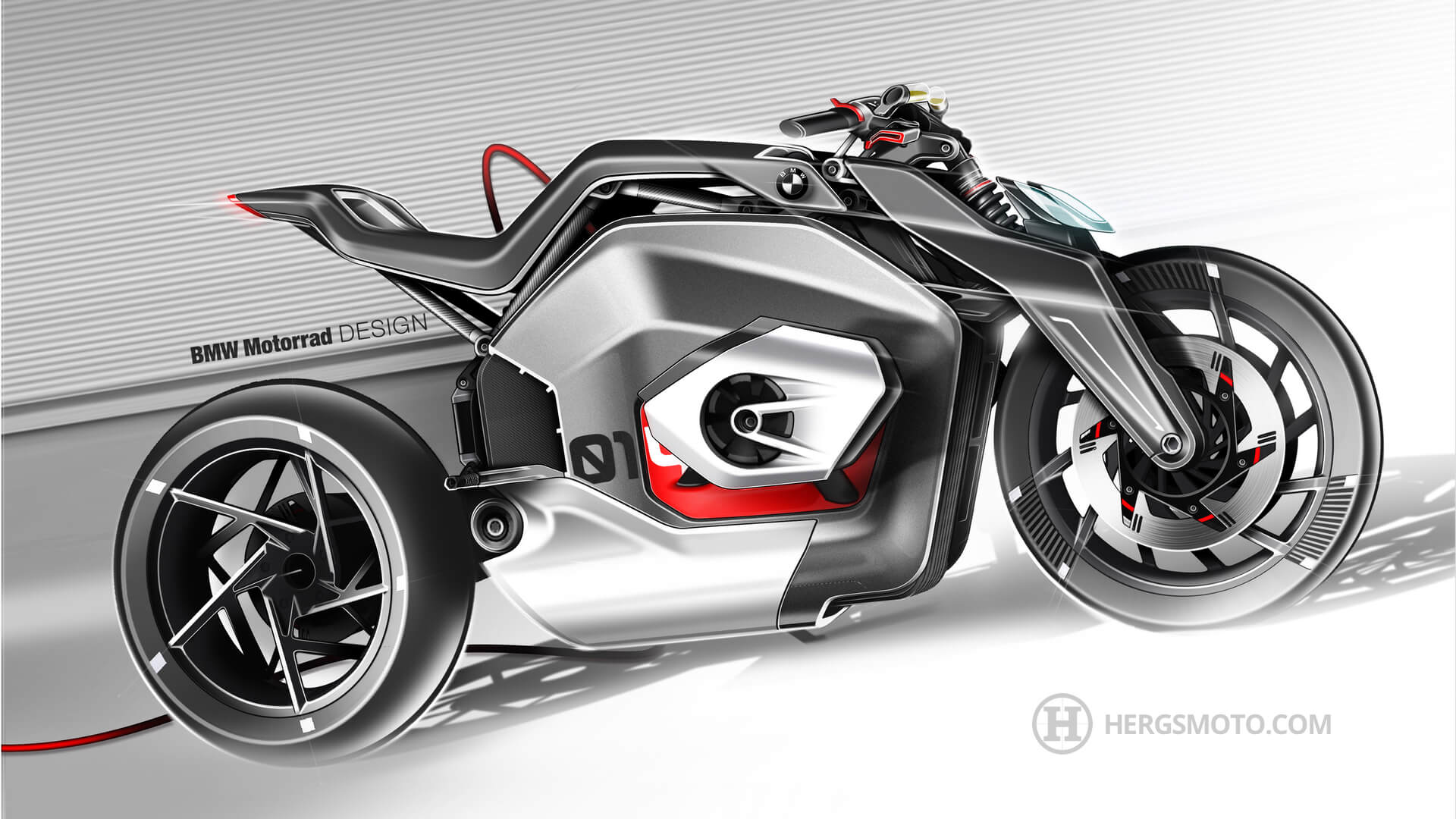
“The boxer engine is the heart of BMW Motorrad – an absolute stalwart of its character. But BMW Motorrad stands for visionary zero-emissions vehicle concepts, too. In view of this, one question that arises is: what would happen if we were to replace the boxer engine with an electric motor and the required battery? The Vision Bike shows how we’re able to retain the identity and iconic appearance of BMW Motorrad in distinctive form while at the same time presenting an exciting new type of riding pleasure”
…explains Edgar Heinrich, Head of Design BMW Motorrad.
The DC Roadster may just be a symbol of a new generation
We then move on to December 2019 reveal of the E-Power Roadster with its front-end from an S 1000 R and the rear drive from an R 1200 RS.
With a frame custom-made and the drive train borrowed from BMW’s car division. The battery pack apparently from a 2-series plug-in hybrid while the motor from a China-only long wheelbase 7-series.
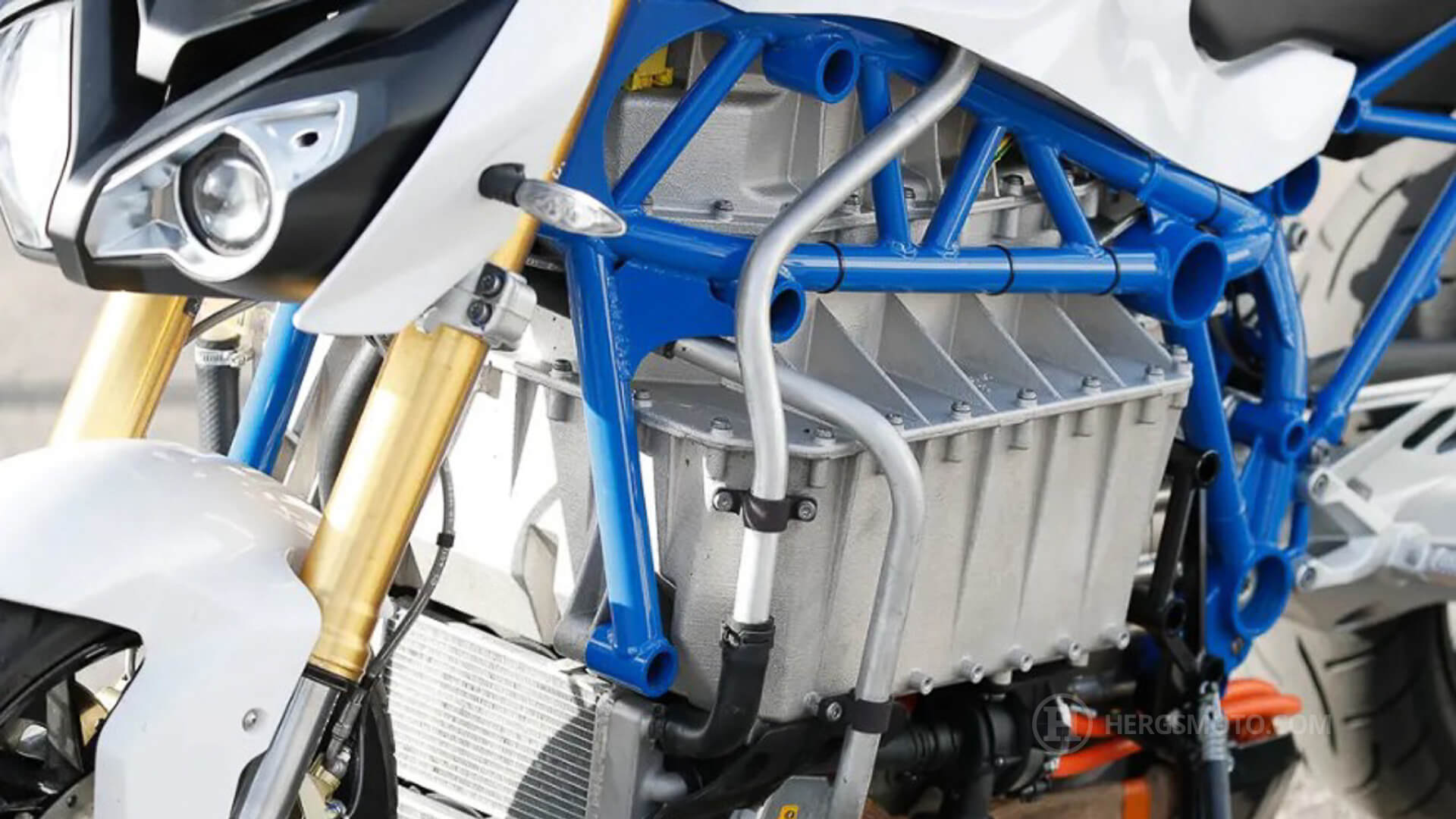
All of 2019 BMW Motorrad had been quietly working on an electric motorcycle dubbed the BMW E-Power.
A select few European journalists were invited to experience a prototype at the BMW Vehicle Development Centre in Miramas, southern France.
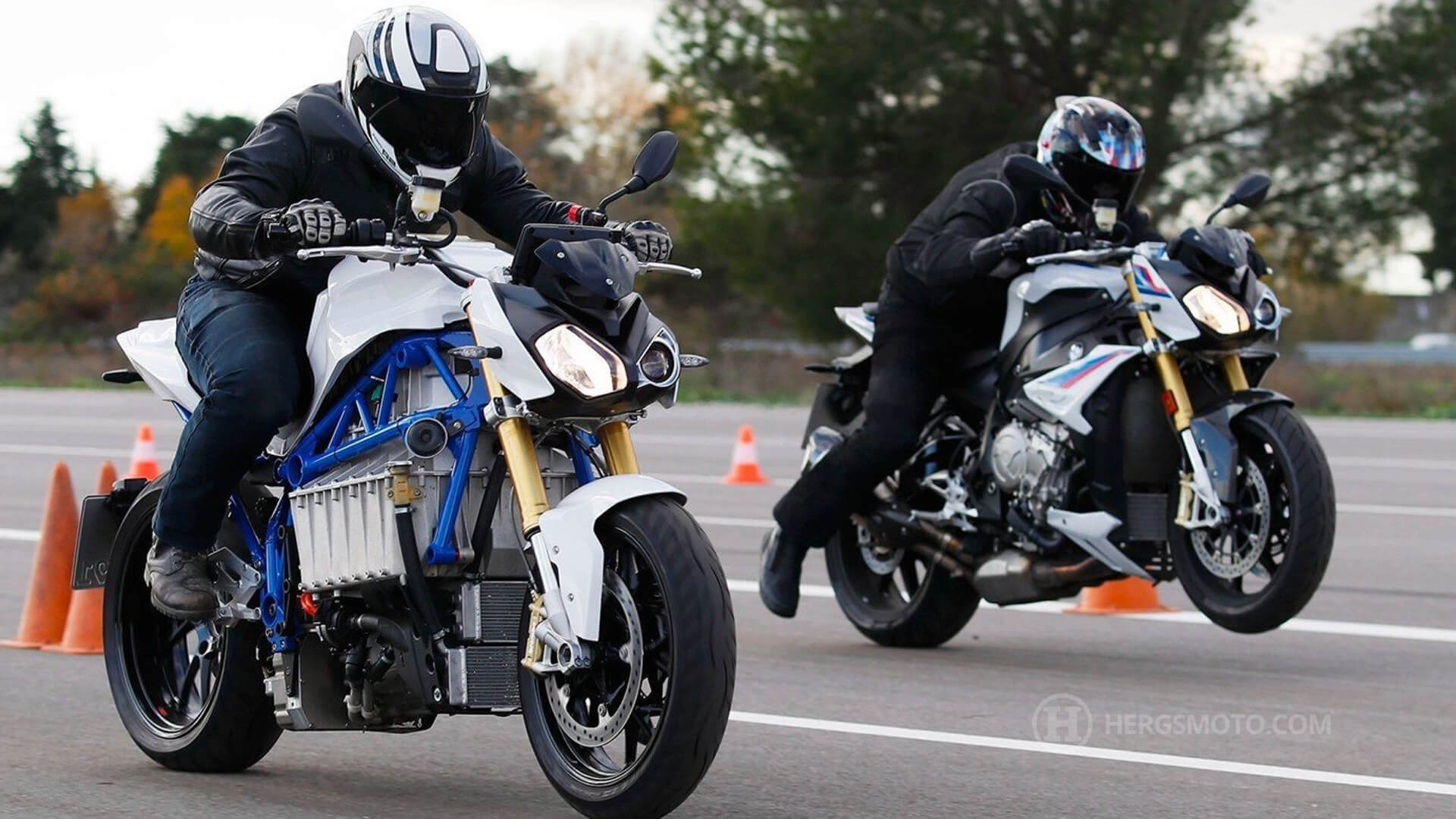
So back to the product development timeline.
So we’ve seen the 2 wheeled product e-volution really started prior to 2009 with the public reveal of the BMW C1-e and then in 2010 we got the “The scooter of the future made by BMW Motorrad” in the form of the new C-series.
Keeping in mind the idea conceived well before, in 2014 we finally got a production version of the C-evolution. A rounded total of let’s say 5 years.
The same for the Link, conceived well before the concept was shown in 2017, then 3 full years later the Definition CE 04. Asked how long until we see it in a production version, in the words of Ralf Rodepeter; Head of Marketing and Product Management BMW Motorrad, “Not too long”.
We figure it could be good for a possible product launch in the second half of 2021. Just on 5 years from inception.
In the mix then of BMW’s e-product future, we’ve also had glimpses of direct and “possible” products still in the design concept stages such as the Supersports eRR, the S 1000 R based roadster and the impressive R-series DC Roadster just 12 months ago. All in various forms of concept design, testing mules and ridable prototypes.
BMW has also registered no less nine eleven trademarks around the ‘DC’ branding. They start with ‘DC 01’ and run to ‘DC 09’, with each one specifically intended for use on motorcycles. As well, ‘CE 01’ and ‘CE 04’ registered with intended for use on scooters.
The ingredients are there for some spectacular products but as we eluded to, BMW don’t do products for the sake of it. Again, evident with some recent comments from Christoph Lischka, Head of BMW Motorrad Development.
“We’re really happy with what we have achieved with the ‘C evolution’ (big scooter), but it is a solution for urban transport,”
“This E-Power Roadster is a sporty bike for someone who wants to ride in the mountains and really enjoy the ride. For this person the bike needs to have 200km (124 miles) of range, so we won’t be releasing a bike like this until it’s capable of 200km-300km of real riding. Right now the market and the infrastructure to support such a machine isn’t ready.”
“We do not want to be like Tesla, installing fast-chargers everywhere – these cost around €110,000 each. At BMW we need to earn money, not burn money.”
Christoph Lischka, Head of BMW Motorrad Development.
While on the surface it may seem simple, vehicle manufacturing is a hugely complex business.
That said, batteries and related technologies are accelerating as is consumer interest and competitive demand around electrified mobility.
As we’ve established, BMW Motorrad are already clearly travelling down a path for e-products with design concepts, product concepts, testing mules and pre-production versions for a future fast approaching. Technology and demand will be at a ripe and commercially favourable point in a few short years.
So postulating roughly 5 years from inception, we ask you; What would you place the odds on…
The launch of a new era for BMW Motorrad with an electric DC Roadster, capturing the essence of BMW Motorrad and celebrating 100 years of motorcycle manufacturing in 2023?
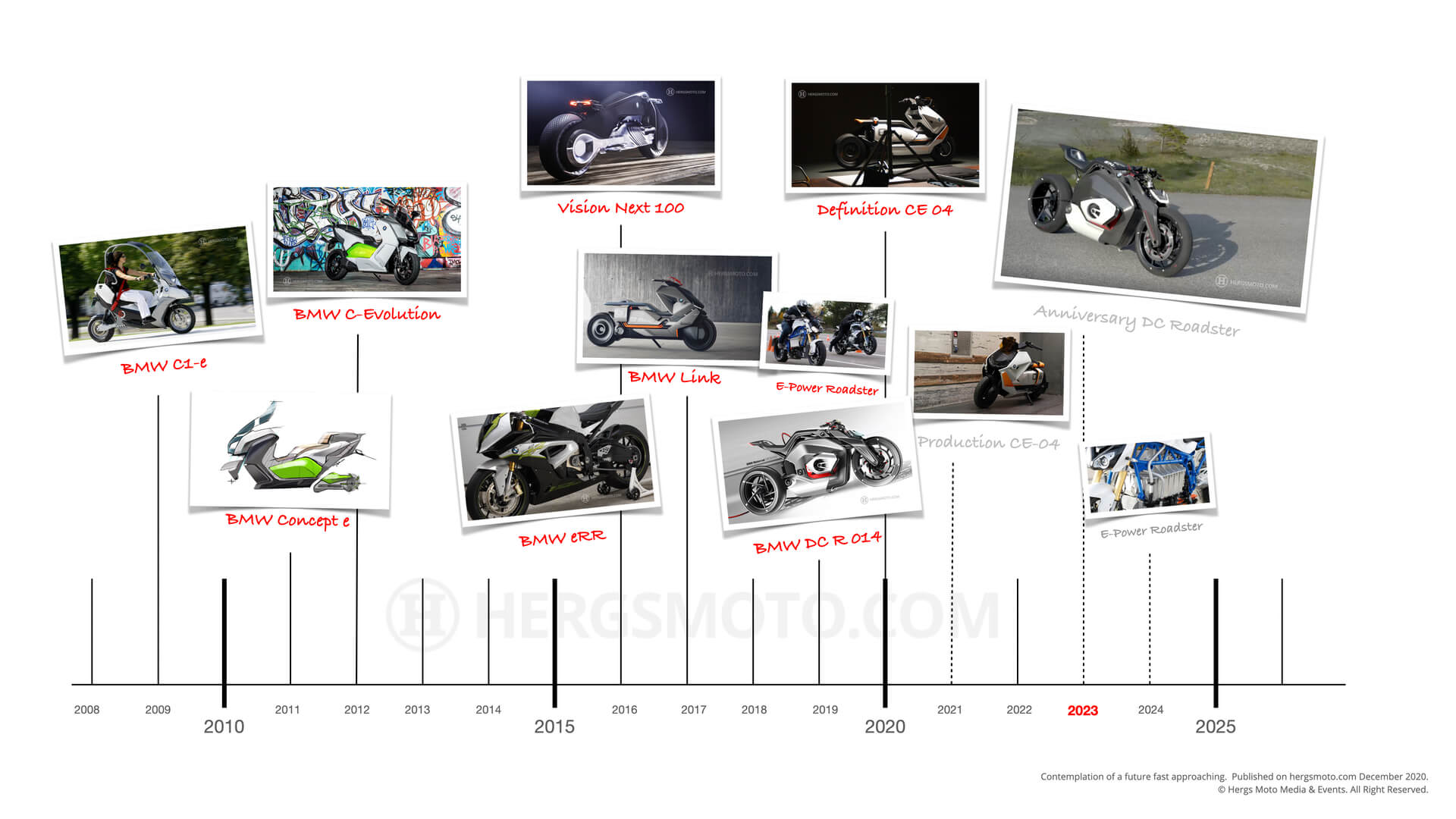
Just imagine that and remember, you read it here in December 2020! We can’t wait.
We’ll leave that thought with you and ride on.
You can read more in the next part of our fast approaching future, in part II on the topic of wearables, technology and more.
Until then, make life a ride.
Credits: Images courtesy of BMW Group. This article is speculative based on publicly available information. Copyright 2020 Hergs Moto Media & Events hergsmoto.com

